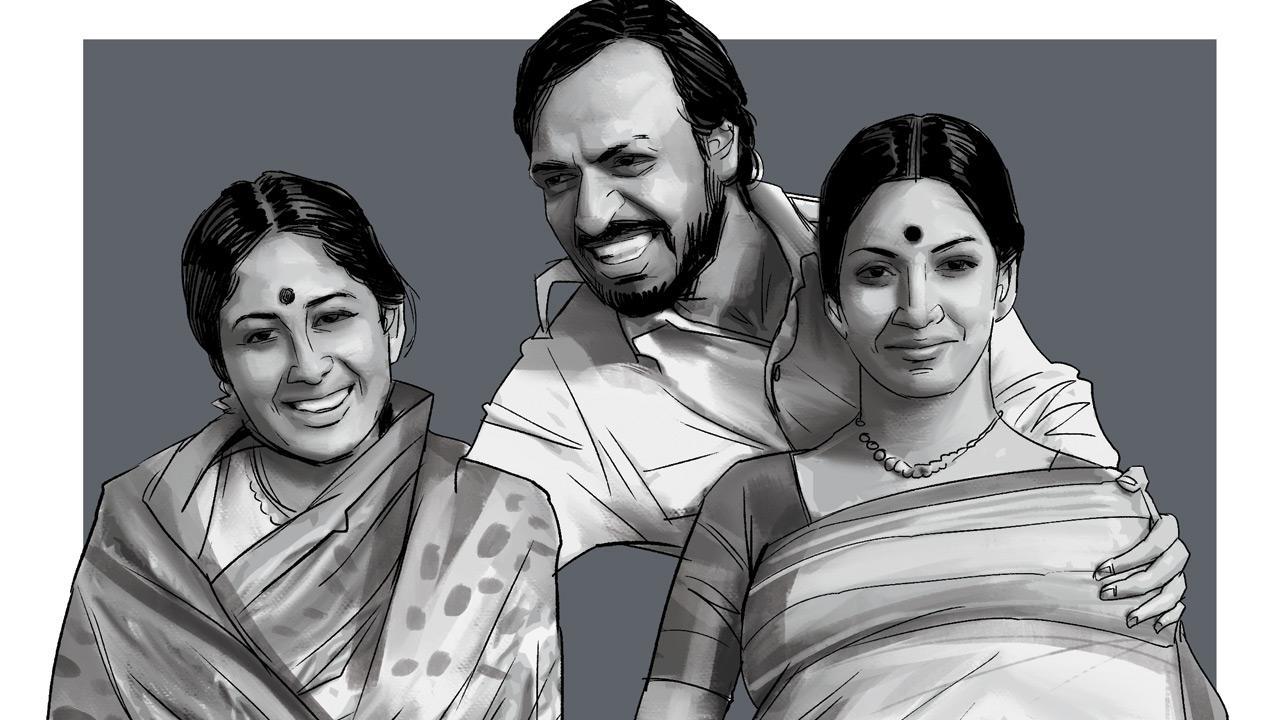But above all, I will remember Shyambabu’s kindness and generosity.

Illustration/Uday Mohite
![]() Veteran and beloved filmmaker Shyam Benegal passed away at 90 of kidney disease on December 23. A mighty tree has fallen. Shyambabu was a key architect of India’s “parallel cinema”, having directed a body of about 75 socially conscious films, documentaries and series, that has left an indelible mark on Indian cinema—and helped place it on the map of world cinema. From Ankur (1974), Nishant and Manthan— that was produced by 500,000 milk farmers donating R2 each— all the way to Mujib: The Making of a Nation in 2023, made when he was on kidney dialysis. Heartfelt condolences to his wife Nira Benegal, daughter Pia Benegal, and all those who loved him.
Veteran and beloved filmmaker Shyam Benegal passed away at 90 of kidney disease on December 23. A mighty tree has fallen. Shyambabu was a key architect of India’s “parallel cinema”, having directed a body of about 75 socially conscious films, documentaries and series, that has left an indelible mark on Indian cinema—and helped place it on the map of world cinema. From Ankur (1974), Nishant and Manthan— that was produced by 500,000 milk farmers donating R2 each— all the way to Mujib: The Making of a Nation in 2023, made when he was on kidney dialysis. Heartfelt condolences to his wife Nira Benegal, daughter Pia Benegal, and all those who loved him.
ADVERTISEMENT
But above all, I will remember Shyambabu’s kindness and generosity. He had recommended me as Festival Director of the MAMI Mumbai Film Festival in 2009, when Sudhir Nandgaonkar, outgoing Festival Director, told me my name had been unanimously approved by the MAMI Board of Trustees. Though that was not to be, I became their International Cinema Programmer, and travelled to Cannes to get films for the MAMI Mumbai Film Festival.
Years later, when I conducted a course on Film Curation for Festivals, for the Film and Television Institute of India (FTII) in 2021, Shyambabu had very kindly agreed to be Chief Guest at the valedictory function. I had specially chosen participants from smaller towns all over India, including Imphal, Patna, Chhattisgarh, Kasargod and Belgaum, where there is a real hunger for cinema— apart from the big metros. Shyambabu shared his journey of cinema; as I remember it, as follows. He was just getting into college in Hyderabad, and tried to start a film society. His uncle told him about a film called Pather Panchali, “made by a commercial artist called Satyajit Ray. It’s a feature, but more like a documentary—somewhat like Nanook of the North—close to life.” So Shyambabu wrote to Satyajit Ray and asked to borrow a print of Pather Panchali, for screening at their film society in Hyderabad. Ray graciously agreed. “We hired a Sunday morning show in a theatre… but we had all of a dozen people at the screening. Yet, I was thunderstruck by this amazing film. I asked the theatre manager if I could watch it again. ‘Come tomorrow morning and just pay the operator some chai-pani,’ he said. So I watched it again in the theatre.” Shyambabu’s film journey had begun. “Much later, I was participating in the inter-university freestyle swimming championships in Calcutta, and got in touch with Mr Ray,” he continued. “He was very welcoming. I went around tea time and we talked about everything under the sun till 9.30pm, but he never once asked me to stay for dinner. I was struck by that. But I was able to arrange a mini-Ray film festival.”
It was a revelation that Benegal was a film curator too. “Once, after lndependence, the Ministry of Information and Broadcasting invited me to ‘go around the world,’ curating the best films for the International Film Festival of India (IFFI). I travelled to North Africa—Algeria, Egypt, Morocco, then Europe—France, Germany, Spain, and North America. It was the first time I had curated anything on this scale, with films from all over the world. My main criteria were: how is this film relevant to India? Could people relate to it?”
He gave us wonderful insights about film curating. “We are all curators,” he said. “When we choose from dozens of films on Netflix, Amazon or any other streaming sites, deciding what films to see, we are all self-curating.”
He had given me interviews over the years as a journalist. I remember when I was quite young and interviewed him for Times of India, I think, I remember always wearing a nice cotton handloom sari and eyeliner for the interviews, cheekily thinking, if he could choose a newsreader like Smita Patil and mould her into such a fine actress, maybe he would do the same for a journalist like me. I hadn’t the slightest intention of becoming an actress, but I think it was just Shyambabu’s incredible generosity and kindness that gave even a pipsqueak journalist like me the idea that I could dream big, even ridiculously big. Never mind, we will meet again further down the road, dearest Shyambabu, and perhaps we can consider that role. Much love.
Meenakshi Shedde is India and South Asia Delegate to the Berlin International Film Festival, National Award-winning critic, curator to festivals worldwide and journalist.
Reach her at [email protected]
 Subscribe today by clicking the link and stay updated with the latest news!" Click here!
Subscribe today by clicking the link and stay updated with the latest news!" Click here!







